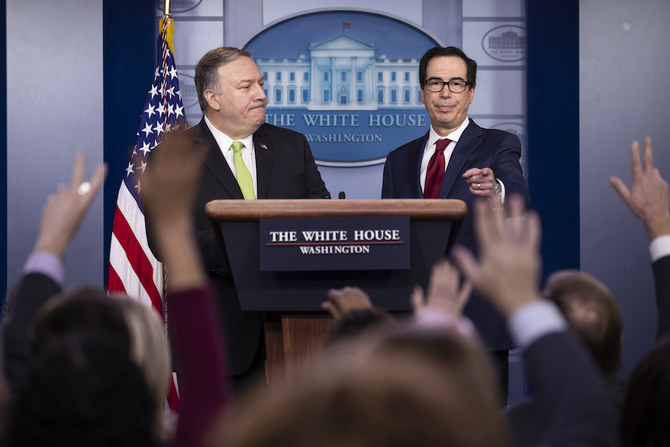WASHINGTON: US President Donald Trump’s senior policy adviser and special representative for Iran Brian Hook has detailed the expanded sanctions on Iran.
The new sanctions were announced by the White House to target eight senior Iranian leaders as well as the country’s metals industry, which Hook said is funding Iran’s foreign policies.
The sanctions were announced earlier by Secretary of State Mike Pompeo and Treasury Secretary Steven Mnuchin.
Hook said that the expanded sanctions include Iran’s construction, manufacturing, textiles and mining industries. He added that they will also target 22 Iranian organizations and three shipping vessels operating in the iron, steel, aluminum and copper sectors.
Hook named one of the eight newly sanctioned Iranian leaders as Rear Adm. Ali Shamkhani, the secretary of Iran’s Supreme National Security Council.
“What’s important about these officials is that these eight have carried Iran’s terror plots and campaigns of mayhem across the region. They are complicit in the recent murders of around 1,500 Iranians protesting their freedom,” said Hook.
He added: “As you know, the secretary of state created a tip line for the Iranian people to submit photos and videos and evidence of regime abuse. We have sanctioned the minister of communications and technology for turning off the internet shortly after the protests ended. We also sanctioned some judges. And today we are sanctioning eight senior Iranian leaders who were involved in brutalizing the Iranian people.”
During a brief teleconference with journalists, Hook addressed the justifications for the expanded sanctions, but not the impact they will have on Iran’s civilian population.
The expanded sanctions follow the decision by Trump to break the nuclear arms deal signed with Iran by his predecessor Barack Obama, and the US’ assassination of Quds Force commander Qassem Suleimani.
Hook said Suleimani was crucial to Iran’s campaign of targeting and killing hundreds of Americans over his 20 years as the Iranian Supreme Leader Ali Khamenei’s most important adviser.
“Suleimani was traveling in the region for the purpose of organizing attacks,” Hook said.
He added: “We have said Suleimani was targeting diplomatic facilities and he was also targeting American service members. He was looking at diplomats and service members, not the first time, because he had orchestrated the repeated attacks on Iraqi military bases that were hosting American coalition forces.
Hook said that “this wasn’t the first time he has done this. He has been organizing proxies in Iraq for some time. When we had him in the region planning imminent attacks against American people and against American interests, the president then took decisive action.
“If we had not taken that action and hundreds of people had died, you would be asking me now, why didn’t we do more to prevent Suleimani from killing so many people?”
Hook described Suleimani as “very effective and very lethal,” adding that he “is responsible for the murder of over 600 Americans.” He said Suleimani served as “the glue that held together the proxy forces in the grey zone” in Iraq and Syria.
“The Iran regime will be held accountable for the attacks of its proxies,” Hook said, citing the killing of an American on Dec. 27, 2019, conducted by the Iraqi paramilitary group Kataib Hezbollah, which he described as an Iranian proxy in Iraq and Syria.
“Iran is the largest state sponsor of terrorism and they are in the most volatile region of the world … Iran can never acquire a nuclear weapon,” Hook vowed.
“The president is issuing an executive order that authorizes the US to impose sanctions on any person operating in or trading with construction, manufacturing, textiles and mining sectors,” Hook said.
“This order is going to have a major impact on the Iranian economy and leadership."
Hook said that despite the expanded sanctions, the Trump administration is “keeping the door open” to diplomacy.
“This regime is facing its worst financial crisis and its worst political arrest in its 40-year history. The regime has very bad options. They are in a state of panicked aggression,” Hook said.
He said all of these sanctions “will remain in place until the regime changes its behavior,” adding that he was hoping Iran “will not respond to sanctions with military force.”
























